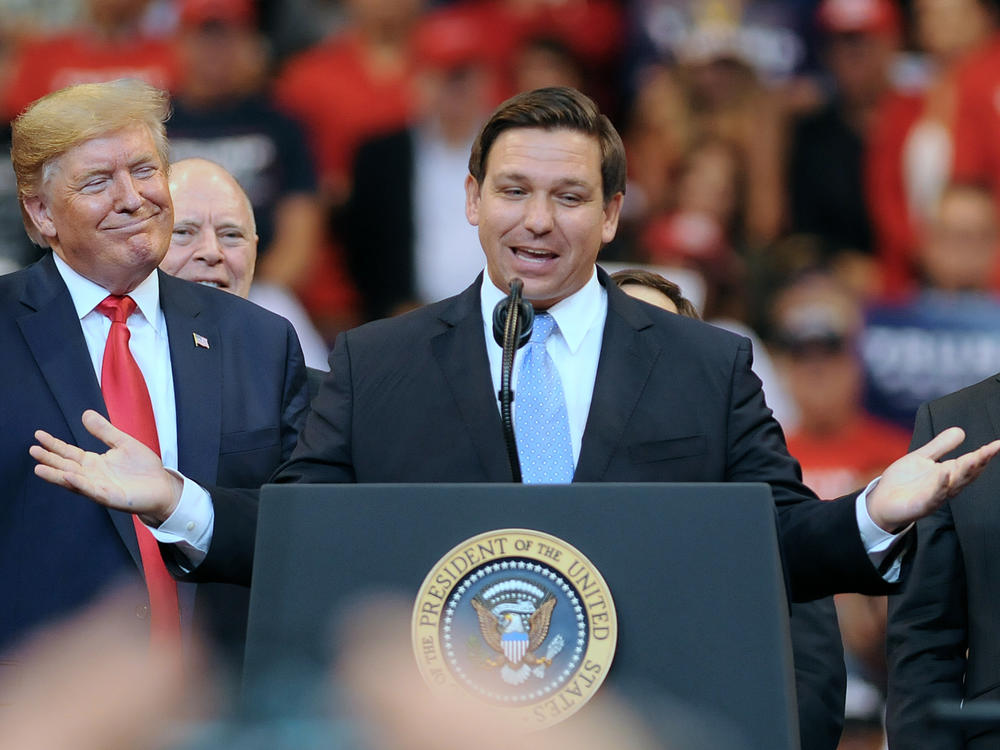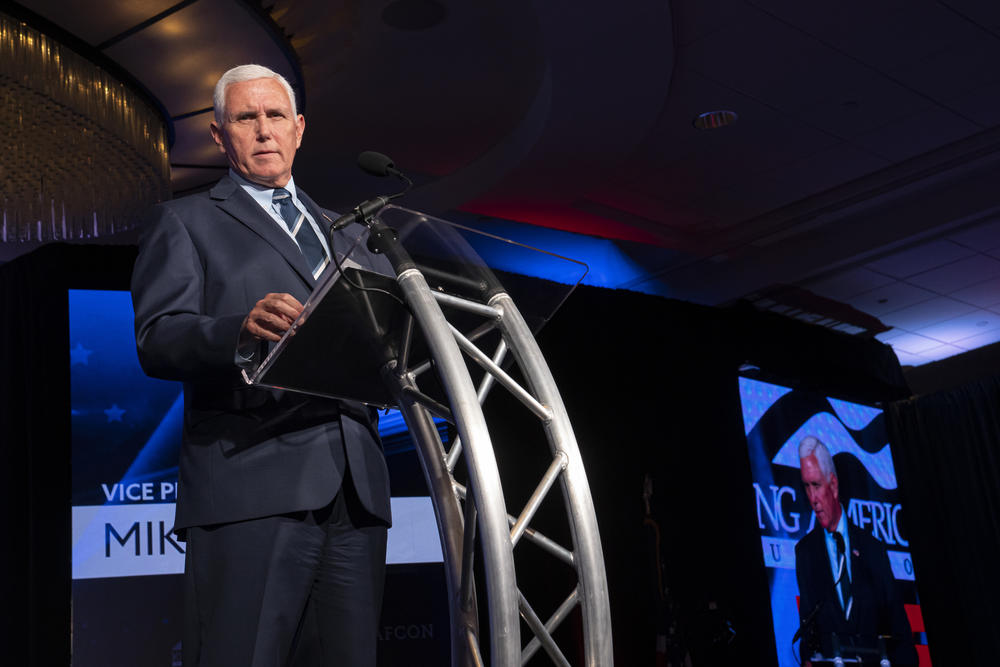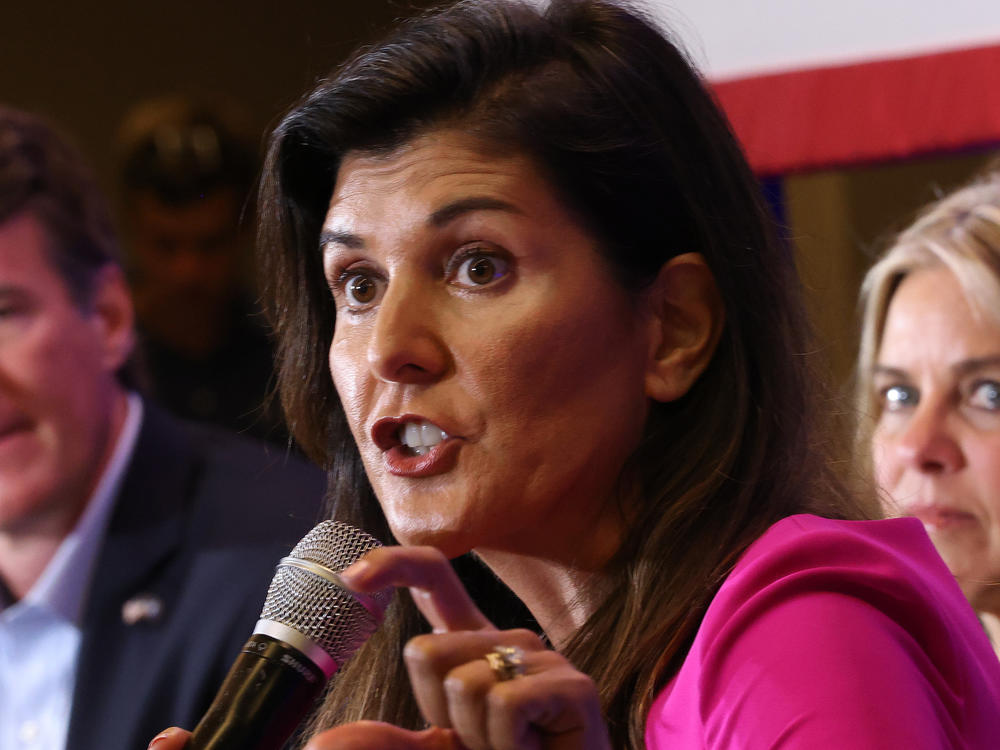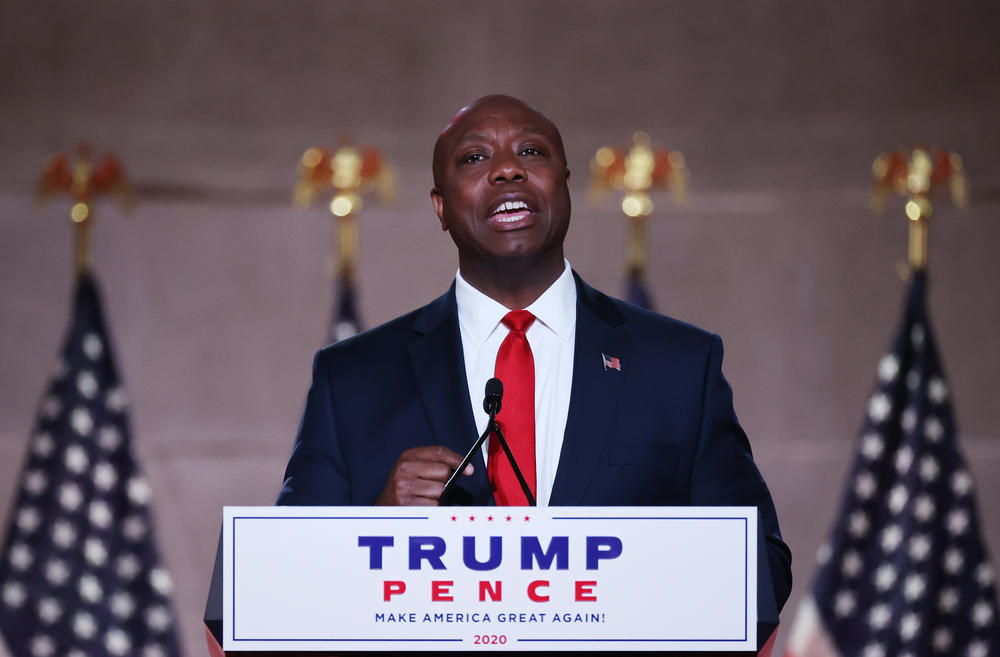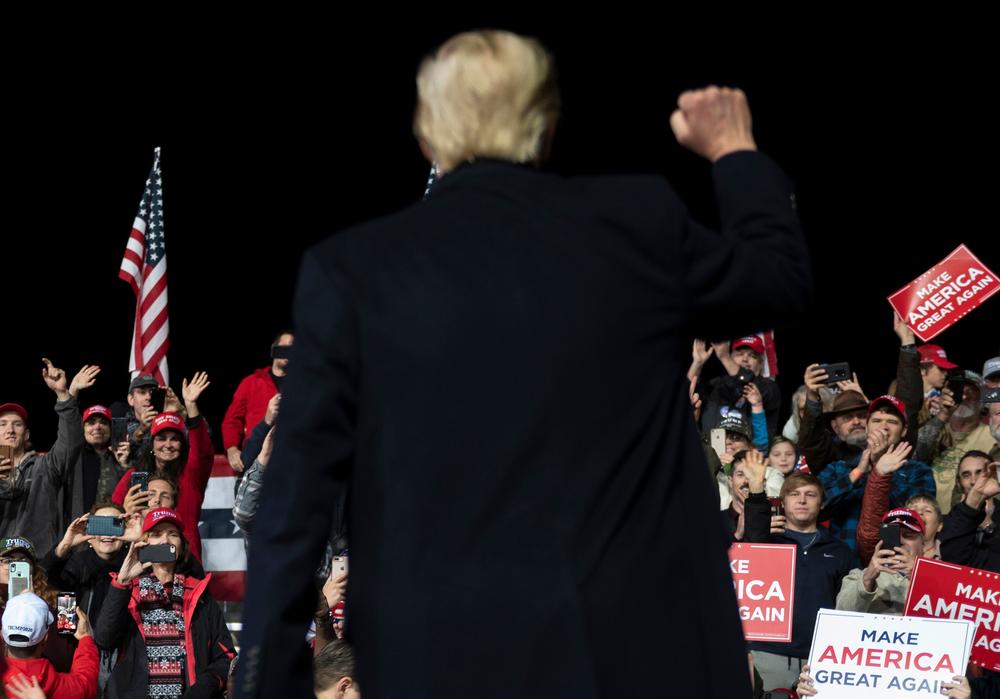Section Branding
Header Content
Jan. 6 hearings chip away at Trump's hold on GOP, as 2024 hopefuls circle
Primary Content
When Casey DeSantis was introducing her husband, Ron, to Florida voters in an ad during his first run for governor four years ago, she insisted he was "so much more" than a Trump devotee.
He was a caring dad who played with their son, read him books and was teaching his daughter to talk. But there was a punchline. The ad showed the blocks they played with were to "build the wall," the book was about how then-President Donald Trump likes to fire people (DeSantis' "favorite part") and the talking lesson used a Make America Great Again campaign sign.
The point of the joke was clear – Trump was the man, and a Republican would be a fool to deviate. Lots of other GOP candidates were finding ways to genuflect to their leader, too. But now, four years later, times are starting to change with some Republican voters contemplating something new.
"I think one of the vulnerabilities for Trump running again in 2024 is that he doesn't have a lot of new material," Sarah Longwell, a Republican political consultant opposed to Trump who has conducted a number of focus groups with Trump voters since the Jan. 6 committee hearings began, told NPR.
She noted Trump's continued relitigation of the 2020 election is getting old for many Republicans.
"I'm not sure that's the right strategy," she said. "One of the things I hear in focus groups all the time from Republican voters is how much they want to move on from the Jan. 6 conversation."
Make no mistake — Trump is still the big fish in Republican politics. Scores of GOP candidates continue to channel him and seek his endorsement. He remains the most popular figure in the party and the frontrunner for the 2024 Republican nomination, if he wants it.
But there are signs that Trump's once-ironclad grip is beginning to loosen. Having lost reelection by millions of votes, and under pressure from multiple investigations, including the Justice Department's probe of his role in the Jan. 6 insurrection, focus groups and surveys (more on the data below) are starting to show that rank-and-file Republican voters are starting to see Trump as a liability.
Even editorial boards once friendly to Trump, like the Rupert Murdoch-owned New York Post and Wall Street Journal have in the last week called him "unworthy" to be president again, citing his "character" and conduct on Jan. 6.
GOP presidential hopefuls, like fish circling chum, are testing the waters. That includes DeSantis, who is now increasingly seen as the most likely post-Trump MAGA standard-bearer; Trump's former vice president, Mike Pence; and lots of others.
The steps taken by these Republicans who are openly angling for presidential runs show they feel safer doing so now than they might have before Jan. 6, the hearings investigating them and Trump's persistent lies about a stolen election.
If not Trump, who?
Ron DeSantis
His is the first name that comes to the lips of Republican strategists and voters when asked who could win the nomination, if it's not Trump or if Trump doesn't run.
Some voters are even saying they like DeSantis more. A University of New Hampshire poll out this week showed DeSantis besting Trump in a primary and faring better than the former president against Biden.
The fact that DeSantis focuses so heavily on Biden's policies is raising eyebrows about his intentions, though his office says he is focused solely on his reelection to governor this year.
- Why the buzz? For as divisive as DeSantis has been in Florida, pushing culture-war issues like how racism is taught about in schools and backing what's been seen as anti-LGBTQ legislation, the Yale and Harvard graduate, who also served in the U.S. House, is seen as Trump, without the baggage. He's their culture warrior without the endless loop of chaos and drama.
DeSantis' popularity hasn't gone unnoticed at Mar-a-Lago, Trump's opulent Florida residence. It's likely why Trump's PAC has sent out polling showing Trump leading a potential GOP primary field – and why he has floated making DeSantis his next vice presidential running mate.
- One challenge: The latest NPR/PBS NewsHour/Marist poll found DeSantis is well liked by Republicans with a 63%/10% favorable/unfavorable rating with them. Trump, though, maintained a higher 83%/15% rating. The survey shows DeSantis has some work to do to increase his name identification, as more than a quarter of Republicans said they weren't sure or hadn't heard of DeSantis, mirroring the 28% of adults overall in the broader sample who said so.
Mike Pence
Pence and Trump's relationship soured after Jan. 6. Pence refused to go along with Trump's scheme to overturn the election by not counting the chosen electors. The rioters at the Capitol then targeted Pence after Trump said he didn't have the "courage" to do what was needed to help him retain power.
Pence is now taking a higher-profile role than at any time since leaving office. This past week, he held rallies and speeches in Arizona and D.C., the same places his former boss did, and he has endorsed opposing candidates to those Trump is backing.
- What he's said: "Some people may choose to focus on the past," Pence said in D.C., alluding to Trump's focus on the 2020 election they lost. "But elections are about the future, and I believe conservatives must focus on the future to win back America."
Pence also has a book coming out, and there's no surer sign of a candidate wanting to run – because they always write a book.
- Reality check: While Pence and Trump held what has been billed as dueling events, Trump's crowds and energy were far greater than Pence's. Pence's favorability ratings also lag the former president's with the base. In the latest NPR/PBS NewsHour/Marist poll, Pence had a 62%/29% favorable/unfavorable rating with Republicans, lower than Trump's.
Nikki Haley
The former ambassador to the United Nations in the Trump administration and former South Carolina governor was critical of Trump's actions on Jan. 6 in the immediate aftermath of the insurrection. But she's since softened her tone.
She's been on the conservative speaking circuit lately, including in the key early caucus state of Iowa last month. "If it looks like there's a place for me next year," she said she would run. Haley seemed a little more bullish on a potential presidential bid two weeks ago when she spoke to the Christians United for Israel summit in D.C. Haley referred to a potential return to an Iran nuclear deal under Biden – with a little something added.
- What she's said: "If this president signs any sort of deal, I'll make you a promise – the next president will shred it on her first day in office," Haley said with a wry smile. After extended applause, Haley added, "Just saying, sometimes it takes a woman."
Kristi Noem
The South Dakota governor is from a state where it's hard to launch a national campaign. She's largely out of the limelight being from there, but she's taking steps to fix that by running national cable ads and digital ads in key early primary states.
- What her ads say: "Here, freedom runs free, so saddle up. We're just getting started," Noem says of South Dakota in a gauzy bio ad showing her racing a horse across an open field. She touts her handling of the COVID pandemic: "Over the last two years, South Dakotans faced dark days, but as dad always said, we don't complain about things, we fix them. And we did. I held the reins and refused to let fear steal our freedom."
- In another ad from earlier this year, she focuses on the culture issue of transgender people in sports – "In South Dakota, only girls play girls sports," an announcer says.
Tom Cotton
The Arkansas senator was in Iowa earlier this month, making two stops. It was his seventh trip there since 2020 – and he didn't rule out a 2024 bid.
- What he said: "We do have a lot of opportunity in 2024, not just for the White House but for the Senate as well," he said, adding about his own presidential prospects, "Future elections I'll consider in the future."
- Taking it seriously: Cotton met with two dozen of his top donors at a posh D.C. hotel last month, Politico reported. Among other things outlined in the story, a senior political adviser to Cotton ran donors through a 15-slide PowerPoint that noted his team had studied past GOP presidential campaigns and that they were taking steps to build an infrastructure. Trump would not necessarily be a deterrence, the report said. Cotton is set to make a final decision after the 2022 midterm elections.
Tim Scott
The South Carolina senator is the only Black Republican in the Senate. He delivered the rebuttal to Biden's first address to Congress last year, and he, too, has made multiple trips to Iowa. When out there last month, he downplayed a potential 2024 bid.
- The exchange: The state GOP chairman asked Scott: "Take us on a little journey of what you're dreaming right now. Someone from the audience shouted: "President!" Scott replied with a laugh: "Of my homeowner's association, yes."
Others are taking steps as well, including Trump's former secretary of state, Mike Pompeo; Sen. Rick Scott, R-Fla.; Texas Sen. Ted Cruz, who won the Iowa caucuses in 2016; as well as Maryland Gov. Larry Hogan and Jan. 6 committee Vice Chair Rep. Liz Cheney, R-Wyo., who would run as explicitly anti-Trump.
Despite their profiles being raised, Trump's decision looms large.
"I'm sure it clears it out significantly," Cruz told Fox News. "We'll see what happens. Look, the lay of the land is everyone is waiting to see what Trump decides to do. Anyone who tells you they're not is lying to you."
Trump made sure to circulate Cruz's comments via his PAC.
The loosening of Trump's grip
There's lots of evidence of Trump erosion. Here's just a sampling – and how the Jan. 6 hearings may be shifting things:
- Increase in blaming Trump for Jan. 6: A Reuters/Ipsos poll also found that 40% of Republicans said before the last Jan. 6 hearing that they now "believe Trump is at least partially responsible for the deadly riot." That's up from 33% before the hearings.
- A drop in Republicans saying the election was stolen: Reuters/Ipsos also found that before the hearings began, 67% of Republicans believed the election was stolen, now it's 55%.
- More Republicans saying they don't want Trump to be the nominee: 55% of Republicans in a recent CNN poll said they don't want Trump to be their standard-bearer in 2024, up from 49% in February. Similarly, Reuters/Ipsos found a third of Republicans said Trump should not run again, up from a quarter before the Jan. 6 hearings.
- Republicans saying Trump's focused too much on the past: 52% of Republicans said in an Echelon Insights survey that Trump is too focused on what happened in the 2020 election, the top reason given for what would be a good reason to oppose a Trump 2024 run.
Trump's choice
Of course, Trump doesn't have to win a majority in the primaries to win the nomination again. He just has to win a plurality, as he did in many of the early 2016 primaries.
And Trump has shown no signs of backing off from a 2024 run. Just the opposite, in fact. At every rally and event he attends, including in Washington, D.C., Arizona and Florida in the past week, he teases that he's running. Trump told New York magazine that he's "already made that decision," and that his "big decision will be whether I go before or after" the 2022 midterms.
"We may just have to do it again," Trump said in D.C. this week. "We have to straighten out our country."
He called the members of the Jan. 6 committee "hacks and thugs," and added, "They really want to damage me, so I can no longer go back to work for you. And I don't think that's going to happen."
That was met with chants of "four more years."
Copyright 2022 NPR. To see more, visit https://www.npr.org.
